
Lindsay is a community of 22,367 people on the Scugog River in the Kawartha Lakes region of south-eastern Ontario, Canada. It is approximately 43 km (27 mi) west of Peterborough. It is the seat of the City of Kawartha Lakes, and the hub for business and commerce in the region.
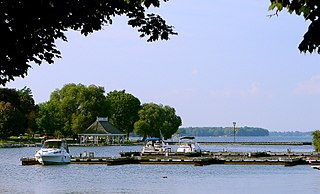
Orillia is a city in Ontario, Canada, about 30 km north-east of Barrie in Simcoe County. It is located at the confluence of Lake Couchiching and Lake Simcoe. Although it is geographically located within Simcoe County, the city is a single-tier municipality. It is part of the Huronia region of Central Ontario. The population in 2021 was 33,411.

Huntsville is a town in Muskoka district, Ontario. It is located 215 kilometres (134 mi) north of Toronto and 130 kilometres (81 mi) south of North Bay. Of the three major Muskoka towns, Huntsville has the largest population and land area.
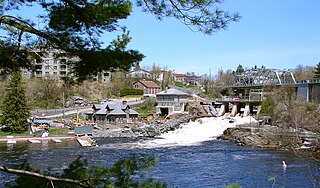
Bracebridge is a town and the seat of the District Municipality of Muskoka in Ontario, Canada.
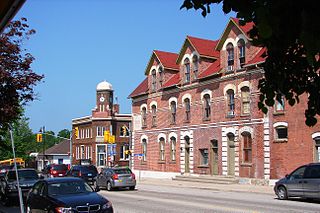
Gravenhurst is a town in the Muskoka Region of Ontario, Canada. It is located approximately 15 kilometres (9.3 mi) south of Bracebridge, Ontario. The Town of Gravenhurst includes a large area of the District of Muskoka, known to Ontarians as "cottage country." The town centre borders on two lakes: Lake Muskoka, which is the largest lake in the region, and Gull Lake, a smaller cottage-bordered lake. Another lake, Kahshe Lake, is situated 10 kilometres (6.2 mi) south of the town.

Norfolk County is a rural single-tier municipality on the north shore of Lake Erie in Southwestern Ontario, Canada with a 2023 population of 73,015. Despite its name, it is no longer a county by definition, as all municipal services are handled by a single level of government. The largest community in Norfolk County is Simcoe, whose 2021 population was 16,121. The other population centres are Port Dover, Delhi, Waterford and Port Rowan, and there are many smaller communities. For several years in the late 20th century, the county was merged with Haldimand County but the merged entity was dissolved in 2000.

The District Municipality of Muskoka, more generally referred to as the District of Muskoka or Muskoka, is a regional municipality in Central Ontario, Canada. It extends from Georgian Bay in the west, to the northern tip of Lake Couchiching in the south, to the western border of Algonquin Provincial Park in the east. A two-hour drive north of Toronto, it spans 6,475 km2 (2,500 sq mi). It has some 1,600 lakes, making it a popular cottaging destination.
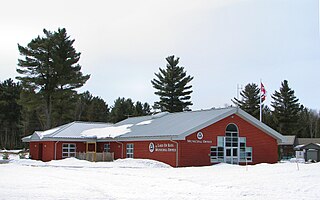
Lake of Bays is a township municipality within the District Municipality of Muskoka, Ontario, Canada. The township, situated 193 kilometres (120 mi) north of Toronto, is named after the Lake of Bays. During the 2016 census, the township had a population of 3,167 and encompassed 677.91 square kilometres (261.74 sq mi) of land.
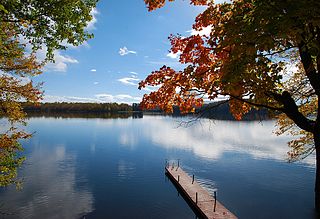
The Township of Muskoka Lakes is a municipality of the District Municipality of Muskoka, Ontario, Canada. It has a year-round population of 7,652.

Central Ontario is a secondary region of Southern Ontario in the Canadian province of Ontario that lies between Georgian Bay and the eastern end of Lake Ontario.

RMS Segwun is the oldest operating steam driven vessel in North America, built in 1887 as Nipissing to cruise the Muskoka Lakes in the Muskoka, Ontario, Canada, a resort area with many lakes and rivers. Early in the 20th century, Muskoka was poorly served by roads. Vacationers were transported to lodges, or private cottages, via a fleet of steamships. Segwun is the oldest of only three ships in the world still carrying the status of Royal Mail Ship, and the only steamer.

Bala is a compact rural community in the township municipality of Muskoka Lakes, District Municipality of Muskoka in Central Ontario, Canada. It is well-known for the Bala Falls, the source of the Moon River, which flows from Lake Muskoka to the Georgian Bay.

Southampton is a community on the shores of Lake Huron in Bruce County, Ontario, Canada. It is close to Port Elgin and is located at the mouth of the Saugeen River in the Saugeen Ojibway Nation Territory. The size of the town is 6.44 square kilometres. The permanent population in 2016 was 3,678, but the summer population is higher since cottagers and campers spend vacation time in the area.

Port Carling is an unincorporated community in the Township of Muskoka Lakes in the Canadian province of Ontario. It has been the municipal seat of the township since 1971. It has several hundred year-round residents and is a service centre for thousands of other seasonal residents in the area.

Lake Rosseau is located in Ontario, Canada, about 200 km (120 mi) north of Toronto. The south end of the lake is in the Township of Muskoka Lakes, and the north end is in Seguin Township. The lake is surrounded by many cottages, some dating back to the late 19th century.

Lake Muskoka is located between Port Carling and Gravenhurst, Ontario, Canada. The lake is surrounded by many cottages. The lake is primarily within the boundary of the Township of Muskoka Lakes, the southeast corner is within the boundary of the Town of Gravenhurst, and another small portion around the mouth of the Muskoka River is within the boundary of the Town of Bracebridge. The town of Bala is located on the southwestern shores of the lake, where the Moon River starts. Lake Muskoka is connected to Lake Rosseau through the Indian River and lock system at Port Carling. The lake is mainly fed by the Muskoka River, Lake Joseph and Lake Rosseau.

Beaumaris is a small settlement in Ontario, Canada, on Lake Muskoka which once served as an important transit point during the steamship era on the lake, and once hosted a summer hotel, called the Beaumaris Hotel. The settlement is located on Tondern Island which, though a true island, is attached to the mainland by a small bridge at Milford Bay. Currently the settlement sports a government pier, The Beaumaris Marina, a general store dubbed Willmotts Store after a prominent Beaumaris family, Saint John's Anglican Church, and a private summer club; the Beaumaris Yacht Club.
Muskoka Lakes Association ("MLA") was established in 1894 in what is now the District of Muskoka on Ontario, Canada. It is Canada's oldest continuously operating cottage association. The MLA represents cottagers' interests in a variety of manners designed to promote the responsible enjoyment and conservation of the lakes in Muskoka.
The Amazing Race Canada 7 is the seventh season of The Amazing Race Canada, a Canadian reality competition show based on the American series The Amazing Race. Hosted by Jon Montgomery, it featured nine teams of two, each with a pre-existing relationship, and one returning team of two given a second chance to compete by fans in a race across Canada. The grand prize included a CA$250,000 cash payout, a trip for two around the world, and two 2019 Chevrolet Blazer SUVs. This season visited six provinces and one territory and travelled over 17,000 kilometres (11,000 mi) during eleven legs. Starting in Toronto, racers travelled through Ontario, British Columbia, Alberta, the Northwest Territories, Saskatchewan, Quebec, and Nova Scotia before finishing in Muskoka. New twists introduced in this season include the One Way, which allowed teams to force others to complete one specific side of the Detour, and the Blind Detour, where teams learned about the task that they chose after arriving at its location. The season premiered on CTV on July 2, 2019, with the season finale airing on September 10, 2019.

















